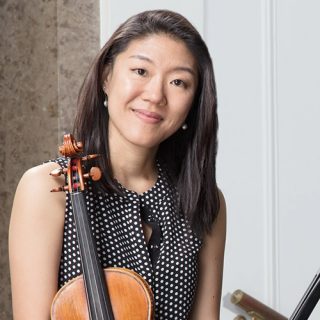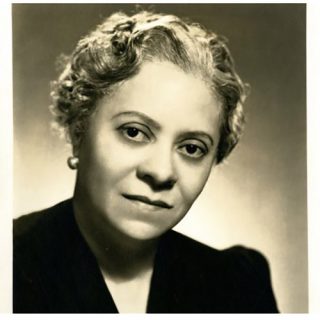Short Talks From The Hill, a podcast from the University of Arkansas, highlights research and scholarly work across campus. Each segment features a university researcher discussing his or her work.
DeLani Bartlette: Hello and welcome to Short Talks From the Hill, a podcast from the University of Arkansas. My name is DeLani Bartlette. On this episode, Er-Gene Kahng, graduate chair of violin in the music department discusses her work on the Florence Price Preservation Project, which aims to bring previously overlooked composer’s works to a wider audience. Welcome Er-Gene.
Er-Gene Kahng: Thank you.
DB: So, would you talk a little bit about Florence Price and why you wanted to make her work more widely available?
EK: Florence Price was born in Little Rock, Arkansas, and I actually was not familiar with her work at all. There was a Florence Price symposium on campus two years ago organized by Professor Jim Greason, who’s now retired. I immediately fell in love with her work. I was particularly charmed by her chamber music. Being a string player, I love string quartets, and I really appreciated the kind of hybrid language that I felt encompassed her work. Something very, very classical for sure and yet also accessible. I would even say there’s something very gentile and loosely sort of Southern in its feel. It’s extremely touching and I immediately wanted to know more about her work and inquired and had many conversations with Jim Greason. The project to become more familiar with her work has taken off in directions that I didn’t necessarily anticipate.
DB: So, do you want to talk a little bit about your experience with that?
EK: When Jim and I were in Special Collections we were looking through some of the manuscripts that had been recently acquired, and he had mentioned, just off hand, “You know she has two violin concertos, right?” And I said, “No, actually I don’t. Everything is new to me at this point.” In one of those boxes was the manuscript, and in some of the other boxes there were the second concerto, which had not yet even been known to historians to be in existence. So this was extremely exciting being involved in classical music, being deeply steeped in the tradition. So I was flipping through these pages thinking, “I wonder what this would really sound like. I wonder if in the hands of a particular orchestra, in the hands of a particular soloist how the details of this notation would come to life.” So I’m not sure where at that point that became then my project. I think I was just faced with a lot of encouragement from people who sort of said, “Well, I think you should take on this project.” I thought, “well, let me take things just one step at time and see how things go,” and I came to fall in love with the project. I still don’t know if I’m the best person to have recorded these concertos but I definitely enjoyed the process. I learned so much and I’m excited to be sharing it with the audience at large and for Florence Price scholars who I’ve come to be very close with. We’re a very tight knit community and a very enthusiastic community.
DB: We talked earlier about Florence Price’s work and that you were able to bring something fresh into the interpretation because it hasn’t been recorded yet. What does that really mean to interpret a composer’s work, and how did you go about that with Florence Price’s work?
EK: By nature, because these concertos have not been recorded, they’re going to be fresh not because I’m such an original interpreter, but just by the fact that it’s going to be new. So I think that element of the “blank slate,” of being able to look at something without necessarily having the specter or the shadow, or the responsibility or the richness even of a tradition that interpreted a work a certain way is no longer there. But then to read between the lines as one might with any literary work. There’s sort of the primary surface meaning that’s there, and meaning that already exists on that level and then what may come from that. From secondary questions or implications or as things unfold in time, how meanings may change. Then on top of that, luckily for performers we’re always allowed and encouraged to see things that maybe the artist, the composer, him or herself may not have been able to recognize. So I tried to have the best conversation I could with Florence Price’s manuscript, and I feel that there is something quite deep emotionally, and I feel almost a sense of instinctive empathy. Not having lived in the 1890s, not having been around at that time, not really knowing too much about her own life but just having this extreme, intense encounter with her chamber music and her concertos. I think for me that artistic process, the real artistic process of it all is that in the end it becomes a work of art. Hopefully the pieces and all that analytical work is not apparent and not felt. It’s just this holistic, organic, emotional journey that people can enjoy and hopefully people can also feel something and interrogate something in their own lives. Like all great art, they have a moment where they’re looking in the mirror and realize, ‘I’m listening to Florence Price but somehow I’m given the space to also feel and think about something in my own life and feel that connection with someone from a hundred years ago.
DB: So, what’s the next step for this project?
EK: Our department; the music department, as part of the Arkansas 75 project, we want to make and share music with all 75 counties of Arkansas. We’re giving ourselves three years to make that happen and obviously it’s an on-going project. Once we sort of make contact and connections with 75 counties, we hope to then foster and deepen those connections as well. I’m hoping to basically share the story and the music of Florence Price with not only Fayetteville and the university and the Florence Price community internationally, but also locally. I think she’s an important role model for musicians, for artists, and she’s very inspiring as a person even if you’re not a musician. To realize that the tenacity of spirit that would be required of a person to produce as much as she did, to face the hardships of life and yet to still produce something artistically is something that anybody can appreciate. Not having enough time to do all the things you can and yet she somehow found a way to triumph above all these daily and life struggles that were a part of her life. How could somebody not be inspired by that? I’m very excited about it. I experience so much joy in encountering something new and I’ve only deepened I guess, that sense of joy and wonderment and amazement going through this project. So I’m hoping to also share that as well with others.
DB: Sounds really great. Thank you so much. Music for this podcast was written by Florence Price and performed by Er-Gene Kahng. For more information and additional podcasts go to KUAF.com or researchfrontiers.uark.edu, the home of research news at the University of Arkansas.






You must be logged in to post a comment.